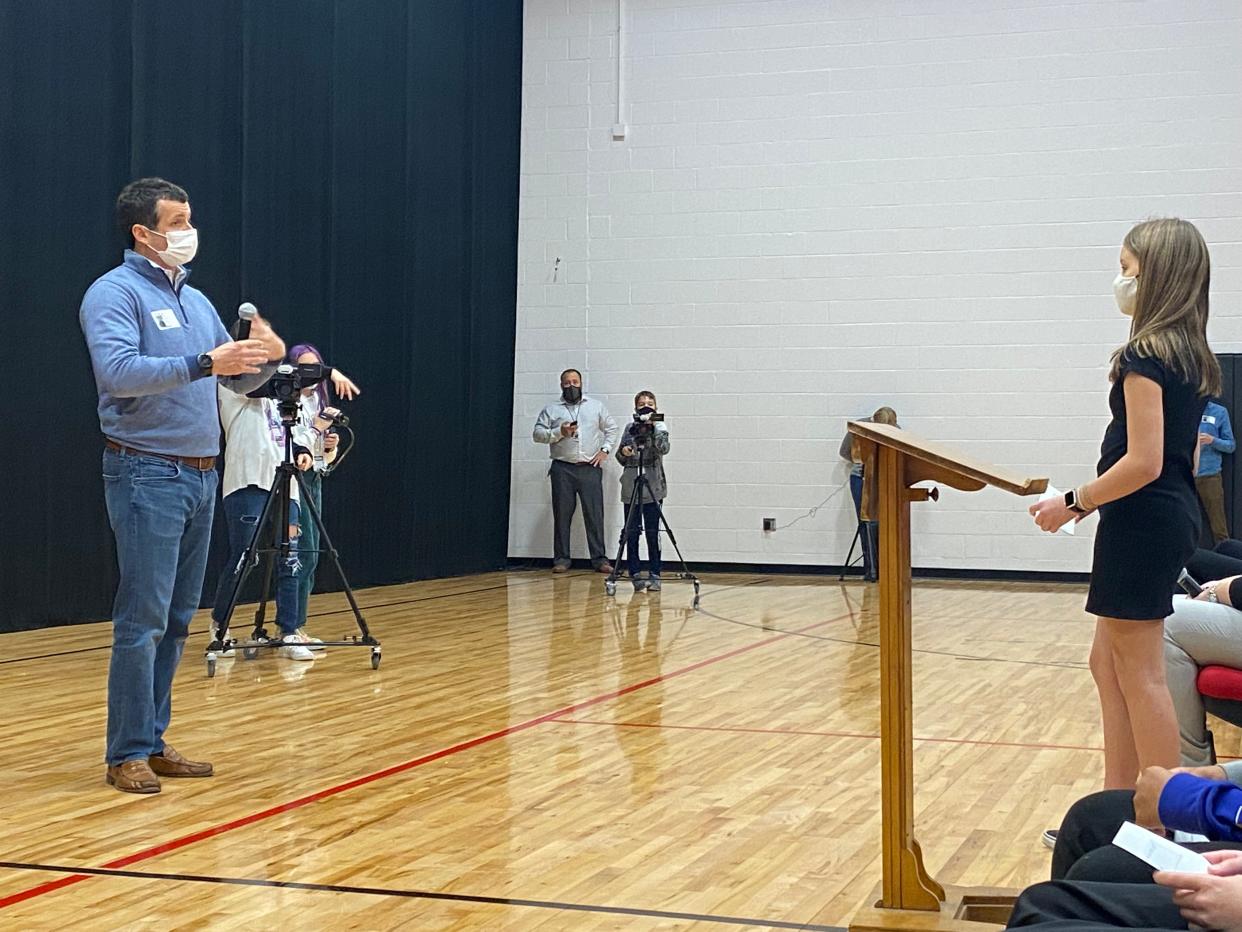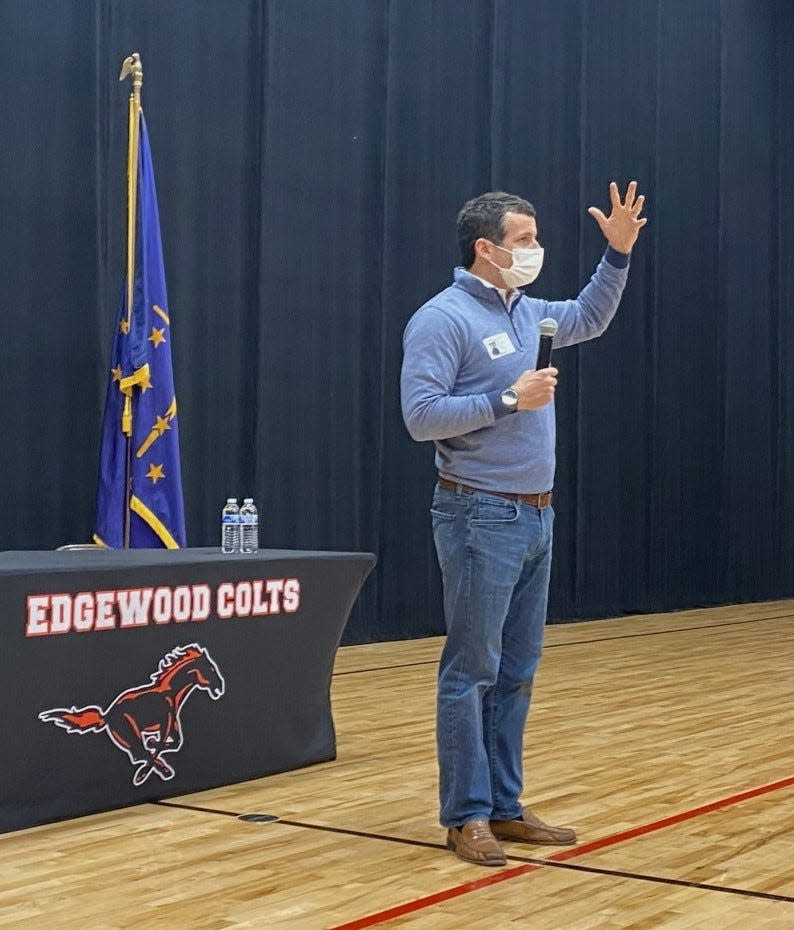Trey Hollingsworth tells junior high students infrastructure bill would get a C-minus

- Oops!Something went wrong.Please try again later.
ELLETTSVILLE — Why did U.S. Rep. Trey Hollingsworth vote against the infrastructure bill?
When Hollingsworth visited Edgewood Junior High School Friday afternoon, students made sure to find out.
Hollingsworth, a Republican who represents much of central and southern Indiana as the state's 9th District congressman, spent the majority of his time at the school answering students’ questions, and media production students and student journalists were sure to capture the moment.
Henry Norris, a sixth grader in Marsi Jones' current events class, was the student to ask about the infrastructure bill. He said since it was something his current events class had learned about, he knew it would be a good question to ask.
The U.S. House of Representatives passed a $1 trillion infrastructure package on Nov. 5. A majority of Democrats and 13 Republicans voted in favor. President Joe Biden is set to sign it on Monday.
Paint chips, ash:Lead cleanup cost from training fire likely to exceed $118,000
Hollingsworth said there were several reasons he voted against the bill, but the main reason is because it would enlarge the nation's budget deficit.
“So the total package was about $1.1 trillion," Hollingsworth said.
That includes about $550 billion in new spending over eight years, according to NPR and other national media. He said he believes $400 billion of the planned funding shifts and new revenue that bill supporters say will help pay for the additional spending is not actual revenue.
"They did a lot of what we call fuzzy math, what you would get a C-minus for in any math class here, in trying to figure out how they came up with that $400 billion,” Hollingsworth told the students.
The Congressional Budget Office has predicted the bill will add about $256 billion to projected deficits over the next 10 years.

Hollingsworth said the reality of deficit spending is that it’s essentially borrowing and spending money today that will have to be repaid in the future. He pointed out the federal government’s current overall debt is about $29.5 trillion.
Ryne Klinger, a sixth grader, said politics are one of the topics of Jones’ current events class and that it was “pretty crazy” that Hollingsworth visited the school.
“I didn’t think I was ever going to meet a representative for our district,” Ryne said. “Never thought that was going to happen.”
But not only did students get to hear from Hollingsworth, they got to pick his brain themselves. While Maisie Scherschel, a sixth grader in Jones’ current events, said she was nervous ask questions, she liked getting the opportunity to do so. Maisie said the students did research on Hollingsworth so they wouldn't ask questions they could already find the answer to.
She asked him whether representing people with different beliefs is easy or hard.
“Like most things in life, it may not be easy, but it's extremely rewarding to see the wide diversity of views we've got in this country,” Hollingsworth said.
“I feel like some Republicans and Democrats don't get along at all, so I was curious how he felt about that,” Maisie told The Herald-Times.
Lake Monroe confrontation: Judge grants, then denies, public defender for Vauhxx Booker
One student wondered what it’s like working as a Republican with a lot of Democrats.
“Your friends and you might not always agree on absolutely everything under the sun, but if you can agree on a few things, then you could probably make something work in that area,” Hollingsworth said.
The same is true for him and his colleagues, he said.
Hollingsworth told the students his goal is to make sure he represents each of them every day in Washington, D.C. Hollingsworth said his goal is to synthesize the information he gets from meeting with groups of people and to take it back to Washington to debate and talk with his colleagues to “hopefully convince some of those colleagues that these problems are worthy of our consideration and that they’re worth us solving for you.”
The overarching goal of that is to create a bright future, he said. It’s easy in today’s world to be pessimistic, he said.
“But I want each of you, if you walk out of here with nothing else, to be really optimistic about your future and our country's future,” Hollingsworth said. “This is a great place. It is a great place to grow up. It is a great place to build a future. And I'm really excited about some of the policies coming out of Washington, D.C., that might create an even better future for each of you that might ensure that you've got more opportunities than you otherwise have.”
Hollingsworth said he mainly focuses on three things: economic policy, funding and supporting things that keep communities safe, like police and the military, he said, and ensuring that the students' futures become better and safer and that Congress is more responsive to their values and needs.
Students also asked about everything from how he became a U.S. representative to if he would recommend his job to any of the students — he encouraged all of them to consider it.
Asked to describe a challenge he’s overcome in his job, the congressman said, “The central challenge of democracy, right, is convincing a wide ranging group of people in order to take a specific action.”
That means convincing enough representatives from across America to support a particular proposal and help pass a bill, he said. He said he’s been able to do that more than any other member on the House Financial Services Committee.
Maisie said most of the things Hollingsworth shared was new information to her, including how frequently U.S. representatives are elected, which is every two years.
“It was just a really cool experience,” Maisie said.
Hollingsworth encouraged the students to stay engaged and to reach out to him any time.
Jones said she first reached out to Hollingsworth when teaching her students about how laws are created. He was supposed to visit the school earlier this year, but that had to be postponed because he needed to vote on something in Congress day. Before Friday’s visit, students updated the questions they’d previously prepared for him. Jones said she was very proud of her students.
When back in class, Ryne said he enjoyed having an experience that’s a bit outside of the school day norm.
“I really like debating, so I like current events, and then having a visitor come in like this really ties it all together,” he said.
Contact Emily Cox at 812-331-4243, ecox@heraldt.com or follow @HT_InSchool on Twitter.
This article originally appeared on The Herald-Times: U.S. Rep. Trey Hollingsworth visits Edgewood Junior High School

